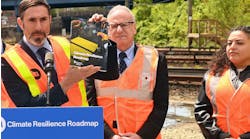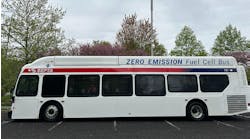Raleigh’s bus system stands to run a deficit of $8.2 million in the coming fiscal year, even if the city decides to begin charging people to ride the bus for the first time since the COVID-19 pandemic.
Without fares, that deficit would be even bigger.
The City Council hasn’t decided whether to reinstate fares yet, but some council members who have opposed the idea seem to be warming to it. Not only does Raleigh need help financing its bus system, but GoRaleigh is taking steps to blunt the impact, including a program to help low-income people continue to ride fare free.
At-large council member Jonathan Melton has been outspoken in support of free buses, saying it “reduces barriers to ridership” and promotes equity. But Melton said his concerns about reinstating fares would be alleviated if GoRaleigh can find a way to keep waiving fares for those who really benefit while also accepting credit cards or other on-the-spot payments to make boarding easier.
GoRaleigh and other public transit systems in Wake and Durham counties stopped collecting fares during the opening weeks of the COVID-19 pandemic to encourage social distancing and reduce contact with frequently touched surfaces, including the fare box. Congress soon passed a huge stimulus package that provided money for public transit agencies, allowing GoRaleigh and others to forgo the lost revenue.
Now the federal money has run out. That, along with inflation and rising labor costs, explain most of the shortfall the system faces, said David Eatman, the city’s transit administrator. The projected $8.2 million deficit for the coming year assumes the resumption of pre-pandemic fares on July 1.
Those fares would generate an estimated $1.8 million for GoRaleigh; without them, the expected deficit would rise to about $10 million.
Council given options on bus fares
Eatman presented three fare options to the council Tuesday: remain free; reinstate pre-COVID fares of $1.25 per ride; or increase those fares to $1.50.
If fares are restored, Eatman said, GoRaleigh would develop a program for low-income riders with the help of local social services organizations such as Oak City Cares, Healing Transitions and Urban Ministries. The details haven’t been worked out, he said, but the program would create a pass for qualified riders.
A survey of GoRaleigh riders last year found that 56% live in households without a car and 41% have annual household incomes of less than $35,000 a year.
“We have a ridership that depends on transit very heavily,” Eatman said.
GoRaleigh would also institute mobile ticketing through a phone app that would track how many times someone boarded a bus each week or month, capping their payments when they reach a certain amount.
Council members had other ideas. Christina Jones and Jane Harrison both suggested creating a way to allow riders to voluntarily pay extra to subsidize the fares of people who need help, on the model of A Place at the Table restaurant downtown.
“That’s a way we can all be part of the solution,” Harrison said.
GoRaleigh ridership remains below pre-pandemic levels
Before the pandemic, fares generated about $3.5 million a year for GoRaleigh, or about 18% of operating expenses; the rest came from various federal, state and local government sources and advertising. About 32% of riders rode for free because they had a pass from an employer or were children, teens or seniors 65 and older.
GoRaleigh ridership has slowly recovered since the first months of COVID-19, but at about 4.5 million a year remains about 85% to 90% of pre-pandemic levels, Eatman said.
The end of federal support tied to the pandemic has forced transit systems to decide whether to resume charging fares. GoTriangle will resume charging riders July 1, with its daily fare increasing by a quarter to $2.50, according to spokesman Eric Curry. The agency is also developing a low-income fare pass for riders who qualify for reduced fares.
The Durham City Council has not decided what to do about fares this coming year, but some members have said they’d like to keep them free.
One Triangle bus system’s fares weren’t affected by COVID-19. Chapel Hill Transit buses have been free since 2002, thanks in large part to a subsidy provided by UNC Chapel Hill.
©2024 Raleigh News & Observer. Visit newsobserver.com. Distributed by Tribune Content Agency, LLC.


